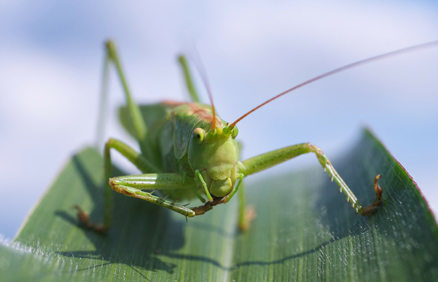Raising locusts for human consumption: a halachic challenge in a changing world

Much of the world population is in a dire state of malnutrition, and the food shortage is projected to grow. A possible alternative for a sustainable, ecologically friendly food source is insect consumption. Can kosher locusts be a halachic solution?
Approximately one billion people worldwide suffer from chronic starvation. By 2050, it is projected that the world population will grow by 9 billion, and along with it will grow the need for protein. Alongside this data, studies indicate that the meat industry is one of the greatest polluters on the planet. A UN study shows that meat production is responsible for 14%--22% of all greenhouse gas emissions.
The solution: Insects?
One of the most important studies on the topic of insects as food was carried out by the FAO (Food and Agriculture Organization) of the UN, together with the entomophagy lab of the University of Vachningen in Holland. The report subsequently published outlines the use of insects as the main solution for the worldwide food crisis. The trend of the growing world population and a higher standard of living on the one hand, and dwindling agricultural soil and water resources on the other hand; along with differences in climate, are expected to exacerbate the state of food deficiency that one billion people experience today, and underlines the need to find alternate sustainable food sources.
There are many benefits to eating insects: nutritional, environmental, and social. From an environmental perspective, raising insects is characterized by a considerably lower level of greenhouse gas emissions as compared to raising cattle; it is also less demanding in terms of utilizing soil and other resources. Insects can be fed with organic waste, and are especially efficient in food consumption. The agricultural cultivation of insects is a specialized field, called "minilivestock." From a social aspect, since it entails little Investment of resources, raising minilivestock can provide employment in urban and rural areas alike. While this branch of agriculture is considered "low-tech," there is certainly a potential to sophisticate it and develop innovative, cutting-edge methods.
On this backdrop, there is a growing movement of entomophagy proponents, who believe that insect cultivation is the solution to the food crisis. They claim that the repulsion involved is only a result of Western social norms, and from all the possibilities for increasing protein supply to the world, insect cultivation is the most nourishing and environmentally friendly. In the Far East today insect consumption, in many different forms, is prevalent.
While there are only nascent studies in the field, there is much scientific evidence that corroborates these claims. It is possible that locust consumption could be the halachic solution to this trend, and today there is an Israeli company that develops locust powder.
It is well known that most Yemenite Jews and some Jews from North Africa eat a particular species of locust that bear signs of kashrut, as this is a halachic tradition that they carry with them. However, the Taz rules: "Today we do not eat any type of locust, even if we know it is called a chagav, since we are not proficient in their names."




